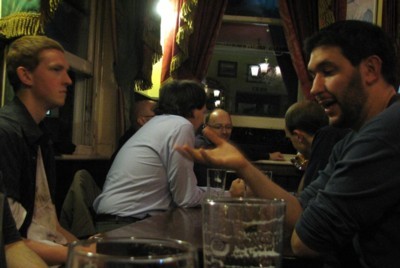We are developing the social individualist meta-context for the future. From the very serious to the extremely frivolous... lets see what is on the mind of the Samizdata people.
Samizdata, derived from Samizdat /n. - a system of clandestine publication of banned literature in the USSR [Russ.,= self-publishing house]
|
Last week I attended that Libertarian Home meeting that I mentioned here, addressed by Tom Burroughes, concerning intellectual property. (Pictures of it, and an outside view of the venue, here.)
I agree with Tom Burroughes about intellectual property. In his talk he sat – learnedly, naming and summarising lots of useful luminaries on both sides of it – on the fence. So do I. When it comes to theism, I am an atheist rather than an agnostic. But concerning IP my agnosticism is as strident as the theism and the atheism, so to speak, of all the other contending parties in this ongoing debate. I think IP has to exist if modern life is to flourish, and will emerge from the contracts people make if by no other means. But, I understand the objections to the various forms of IP that come in such abundance from those who disapprove, not least the fact that so much of IP enforcement seems to depend on the state chucking its weight around. IP needs to exist, but it also needs to be treated with suspicion.
I won’t say any more about IP than that. When I later emailed Simon Gibbs about what a good meeting I thought he had arranged and compered, adding that I hoped some time soon to be writing something to that effect for Samizdata, he suggested I might want to wait for the video. When it comes to us all arguing about what Tom Burroughes said about IP, that probably makes sense. But I also want to elaborate a bit about what a good meeting it was, as a distinct point. My basic point being that it really was very good. → Continue reading: The Libertarian Home meeting last Thursday and the difference that a speaker makes
I was just about to do a posting here linking to this Anton Howes piece, but I see that Johnathan Pearce has go there first, see below. I strongly agree about the importance in particular of student libertarianism, which the Liberty League is doing so much to encourage.
The only thing I now need to add to that is that earlier this week I promised Anton Howes I would mention here that the Liberty League‘s Freedom Forum 2012 is coming up soon, on the weekend of March 30th/April 1st, in Newcastle.
This is not a convenient place for me, but is massively more convenient for northern English and Scottish libertarians than such an event as this would be if held in my own London, as most such British events have tended to be. I hope this event goes really well.
I see that occasional Samizdatista Alex Singleton is already signed up as a speaker.
I know Anton Howes, a smart guy who is part of the new generation of 20-somethings making their mark in spreading pro-liberty ideas in our university campuses in the UK.
“In the UK alone, the number of freedom-oriented student groups quadrupled in just a year from 7 to around 30, and the conferences held by the Liberty League, the UK’s network for young libertarians already attract over 100 people. The presence of these groups allows for all sorts of possibilities. Once they start to use their support to make their voice heard around campus, it will no longer appear as though the radical left is dominant in universities, and this may eventually lead to a new status quo in student politics.”
The vibrancy of the libertarian student movement over the past few years has been one of the more encouraging things I have observed lately. It is worth bearing this in mind when contemplating the inevitable cat fights (organising libertarians is a bit like herding cats) that have roiled certain groups in recent years. Regarding that point, I hope that the CATO Institute, which produces a lot of good work, does not get damaged by a wrangle over the estate of the recently deceased William Niskanen.
As already mentioned here from time to time in recent weeks, I have been doing some tidying up. My place was a mess. More politely, it was suffering from severe infrastructure overload, which is that terrible condition that sets in when each new thing that comes in or gets done causes a wave of knock-on chaos out of all proportion to what ought to be its impact. To put this down, I make some space for it by moving this important item, on top of that important item, and then forget where it all is … you get the picture.
If you have never in your life suffered thus, that can only be because you have never done anything. Places where real stuff gets done frequently teeter on the edge of chaos. This is another Parkinson’s Law. I recall, in one of his books, contrasting pictures: of the Officers Mess (not a mess at all), and the Orderly Room (not orderly at all). The point being that it was in the latter place that all the work got done.
But there comes a time when consoling yourself with the thought of all those chaos-inducing accomplishments just doesn’t do it for you any more. You just have to stop – at the very least interrupt – everything else and turn back the tide, which is what I have forced myself recently to do. This has already the most serious tide resistance I have done since moving in here over two decades ago.
My problem was that although this task had become slowly more important, it had at no point become overwhemlingly urgent. So, how was I to motivate myself to get stuck into it? No externally imposed deadline loomed. No angry associates would punish me if I delayed. It was merely that if I delayed it yet longer, my life would work gradually less and less well.
If you are the sort of person who needs only to know that some task is important in order to start attacking it with enthusiasm, confident that you will conquer it, then this posting is probably not for you. If on the other hand you are like me, easily daunted and tempted hideously to postpone tasks which combine non-urgency, great importance (but only to you) and demoralising hugeness, then maybe skipping this might be an omission of significance. If the question “where do I start?” regularly recurs in your life, then read on. You might discover things of value. → Continue reading: Urgent and Important versus Easy – on tidying up my home – and on how to do libertarianism
Madsen Pirie’s new book, Think Tank: The Story of the Adam Smith Institute was launched earlier this evening in the crypt of St John’s, Smith Square. Here is what it says in the book’s first chapter, entitled “Shaping an institute” (pp. 3-4):
There was an institute in London which drew heavily on Smith’s ideas, and those of the free-market economists who had followed in his wake. This was the Institute of Economic Affairs (lEA), founded by Sir Antony Fisher twenty years earlier, and which had published a steady stream of monographs analyzing the deficiencies of central direction, state planning and economic intervention. They were intellectually rigorous, and had made their way into the literature of economics libraries, albeit in a separate corner, almost fenced off from the mainstream.
But we wanted something more. It was all very well to win theoretical arguments, but nothing seemed to happen afterwards. Governments continued on their unruly ways, while academics devised new follies to set up on the wreckage of the old ones. We wanted to change reality; to have an impact on what actually happened. We wanted to make policy.
Adam Smith might have been one strong influence on our thinking, but there were others. One was James Buchanan, the Nobel Laureate who, with Gordon Tullock, James Niskanen and others, developed what came to be known as Public Choice Theory. In essence ‘it took the ideas of economics into the domain of politics and administration. Instead of ‘treating politicians and civil servants as selfless seekers after public good, the theory treated them as if they were ordinary economic participants, out to maximize their own advantage, just like other people. it proved a very fertile theory tor explaining what would otherwise have been incomprehensible outcomes. It also fitted in with the rather less than respectful way that we ourselves regarded politicians.
Public Choice told us how minority interest groups could hijack the political agenda to have advantages created for themselves. It explained how politicians respond to pressure from vociferous and self-interested groups, but not from a public at large which might be largely unconscious of the effect policy made upon it. Public Choice Theory was basically a critique, but we began to wonder if there could be a creative counterpart to it. Just as Public Choice Theory told us why certain policies were doomed to political failure, however economically sound they might be, could it not be used to create policies that would not be subject to these limitations? Could new free-market strategies be crafted that flowed with political reality by building in the support of the interest groups which might otherwise derail them?
This was powerful stuff. …
Indeed it was. As soon as I’ve read the rest of this book, I’ll tell you what I think of it.
Meanwhile, here is a picture I took at the launch, of the author hard at work signing copies.
Not surprisingly, the ASI blog already has a posting up on the subject.
Yes. This …
… has finally moved out of my home, and out of my life. Last week, Men collected it and took it … I don’t know where. A dump, presumably.
I recently wrote here about the continuing life of physical books and about the limitations of the idea of the paperless office or paperless home. Office-working commenters piled in to describe the persistence of paper in their offices, often in the teeth of earlier diktats from on high to the contrary.
But as far as my own libertarian activities are concerned, I really have pretty much completely abandoned communicating on paper, with my own writing, and most definitely with anyone else’s. Which means that this machine, with which I once processed all the paper that I once processed, really had to go, if only to help me to accommodate my ever increasing hoard of books. Only inertia had caused the photocopier to linger on, in my kitchen. That, and the affection I still feel for something which once made such a difference to my life.
A simple way of describing what this machine did for me, and for a small gang of mostly London-based libertarians, from the 1980s until the early 2000s, is that it enabled us to do something like blogging, before there was blogging. → Continue reading: My photocopier – 1981-2012
One of the more dispiriting processes I regularly notice in confrontations between Good and Evil is when Evil concedes that it has done something evil, and Good promptly turns round, in the spirit of fair play, and concedes something else evil. It’s like Good is a football team, and when it goes one-nil up, it feels that the fair thing to do is to give the other fellows a goal. To make a game of it. Or something.
So, for instance, if Evil concedes that, I don’t know, “socialism hasn’t turned out very well in practice”, Good, in a burst of bonhomie and generosity and brotherhood-of-manliness, concedes that socialism was a nice idea “in theory”.
No it wasn’t. An idea that turns out badly in practice is a bad idea. Especially if the badness was a predictable and predicted consequence of that bad idea.
Often, in circumstances like these, Evil even asks for an equalising goal.
Evil offers a pairing of ideas – good twinned with evil, like socks emerging from the laundrette – as a package: “I’ll concede that socialism has turned out badly in practice if you concede that socialism is a nice theory.”
The proper way to behave, if you are Good, and go one-nil up in an argument, is to press for a two-nil lead.
The proper response to going one-nil up in the above argument about the practice and theory of socialism is to say: “Socialism has indeed turned out badly in practice. Now, about this evil notion of yours that socialism is a nice theory. Let’s talk about that. And let’s you admit that you are wrong about that also. We told you you were wrong from the start, and we were right that you were wrong. We predicted that socialism would turn out badly in practice, on account of it being a bad theory. You pressed on. You were wrong. In theory as well as in practice.”
Like I say, press for two-nil.
So, all hail to Mark Meckler. (And further hail to Instapundit for linking to the story, today, and earlier.)
Meckler, arriving in New York and learning that he must not carry a gun, handed his gun over to the New York goons. (That much, he was willing to concede.) The goons promptly arrested him, for carrying the gun up to the point where he stopped carrying it, or something.
Faced with a determined Meckler, and a huge outcry of rage and contempt from the forces of Good, the New York goons have dropped their evil charges. One-nil to Meckler. But Meckler is now being subjected to another evil injustice. The goons still have his gun, and are refusing to return it.
Instead of thanking the goons for being so nice about not arresting him any more, Meckler now wants his gun back. Quite right. New York goons, give the man his gun back! (This is now an international campaign. I am international and I now say this.)
Saying “now give me back my gun” is not only the good thing for Good Mr Meckler to do; it is also excellent tactics. He is now one-nil up. He faces the chance to score another goal, and go two-nil up against the forces of Evil. He is now pressing to do just that.
Quite right. When you have argumentative momentum, against a team that is saying (or in this case also doing) not just one bad thing but many bad things, use it. Thereby keep it, and build it.
When the New York goons do hand back Meckler’s gun, if they ever do (and actually, even if they don’t), the proper next response, from all of us who have now rallied around Meckler, is: “Now, about all these other gun-carrying people, against whom you have not dropped the charges, and whose guns you have not returned …” Three-nil. Four-nil. Five-nil …
If the New York goons don’t hand back Meckler’s gun, perhaps because they sense that if they do, Meckler’s team will then get more momentum, then the New York goons will be digging their heels in in an argument that they will hate but which the Meckler team will relish.
Also good. Shame about the stolen gun, but also good.
Indeed. Press release from these guys:
Good luck with that.
Seriously, good luck with that.
I will try to be there.
It is time for the simple debate to end and all out war to begin. The Edison bulb bannings by the global class of intellectual Aristocrats is the step too far. To assist all in declaring their allegiance I have generated this handy war logo which could double as a war pennant:

Down with the Greens!
Graphic: copyright Dale Amon, Released under Creative Commons license.
It is hard to believe that great and articulate thorn in the side of the left, William Buckley, has been gone for four years. What would he think of what has transpired since? A friend of his discusses that question and gives us a clarion call of resistance from the great man’s own words:
“I will not,” Bill wrote,
cede more power to the state. I will not willingly cede more power to anyone, not to the state, not to General Motors, not to the CIO. I will hoard my power like a miser, resisting every effort to drain it away from me. I will then use my power as I see fit. I mean to live my life an obedient man, but obedient to God, subservient to the wisdom of my ancestors; never to the authority of political truths arrived at yesterday at the voting booth.
To which I will only add, Amen.
Resistance is not futile. It only takes 15% of a population opting out to bring any overbearing state to its knees. We only need a 15% Galt factor to completely spike the socialist enterprise.
Earlier this evening I attended a libertarian get-together in the upstairs room of a pub (the Rose and Crown in Colombo Street, London SE1), organised by Libertarian Home, and in particular by leading LH-er Simon Gibbs.
If what you would like would be a convivial evening in a London pub where, if you are not a libertarian you are going to have to explain yourself, whereas if you are you aren’t (unless you feel like it), then why not get in touch with Simon Gibbs and invite yourself along to the next one of these things. If my experience this evening was anything to go by, you will be made very welcome.
Here is a photo I took of the other end of the table from where I was:
And here’s another snap from the same spot, moments later, after I’d asked if I could interrupt everything, and “take some photos”:
I am surprised what good photos these are, technically, given the light. If you are surprised what bad photos they are, technically, then clearly you don’t know my photos.
These photos do not include anything like everyone who was present. They are accurate in suggesting that the gathering was youngish (certainly compared to me), and bright, but inaccurate in suggesting that this was an all male affair. It’s just that the ladies present were seated nearer to me, and my lens is not wide-angle enough to have included them.
In particular, missing from that snap are two of the people who, it so happened, I spent a bit of time conversing with. For the first time ever, I got to meet Trooper Thompson in the flesh, whose blog I have long had a liking for. And, I also got to meet “Misanthrope Girl”, whose blog I have not properly noticed until now. Trooper Thompson got chased out of the Samizdata commentariat for saying something rude about a gun (I think that was it), approximately a decade ago, which, having finally met the guy, I now think is a shame. Misanthrope Girl would also fit in here very well.
I had to leave earlier than I would have liked, but I am still very glad I went. I heard about this gathering by attending the Liberty League Conference, where Andy Janes (mentioned here recently already because of that Zimbabwean bank note), who also helps organise these evenings, suggested I might like to attend the next one. Perhaps, I thought to myself, and perhaps not. But then Andy gave me a physical copy of the leaflet that he had been handing out at the Occupy London occupations. These guys, I thought, maybe have something about them. (See also this open letter to the London occupiers.) Maybe they do. We shall see.
Do you think that the people occupying Wall Street are all idiots, parasitical permanent students, studying nothing of value, and demanding everything in exchange for that nothing? See also the previous posting, and its reference to “the zombie youth of the Big Sloth movement”.
Maybe most of the occupiers are like that, but this guy seems to have grabbed the chance to say something much more sensible. Fractional reserve banking (evils of). Gold standard (superiority of). Bale-outs (wickedness of). Watch and enjoy.
What a laugh (in addition to being profoundly good) it would be if the biggest winners from these stupid demos were Ron Paul, and the Austrian Theory of Money and Banking.
|
Who Are We? The Samizdata people are a bunch of sinister and heavily armed globalist illuminati who seek to infect the entire world with the values of personal liberty and several property. Amongst our many crimes is a sense of humour and the intermittent use of British spelling.
We are also a varied group made up of social individualists, classical liberals, whigs, libertarians, extropians, futurists, ‘Porcupines’, Karl Popper fetishists, recovering neo-conservatives, crazed Ayn Rand worshipers, over-caffeinated Virginia Postrel devotees, witty Frédéric Bastiat wannabes, cypherpunks, minarchists, kritarchists and wild-eyed anarcho-capitalists from Britain, North America, Australia and Europe.
|









